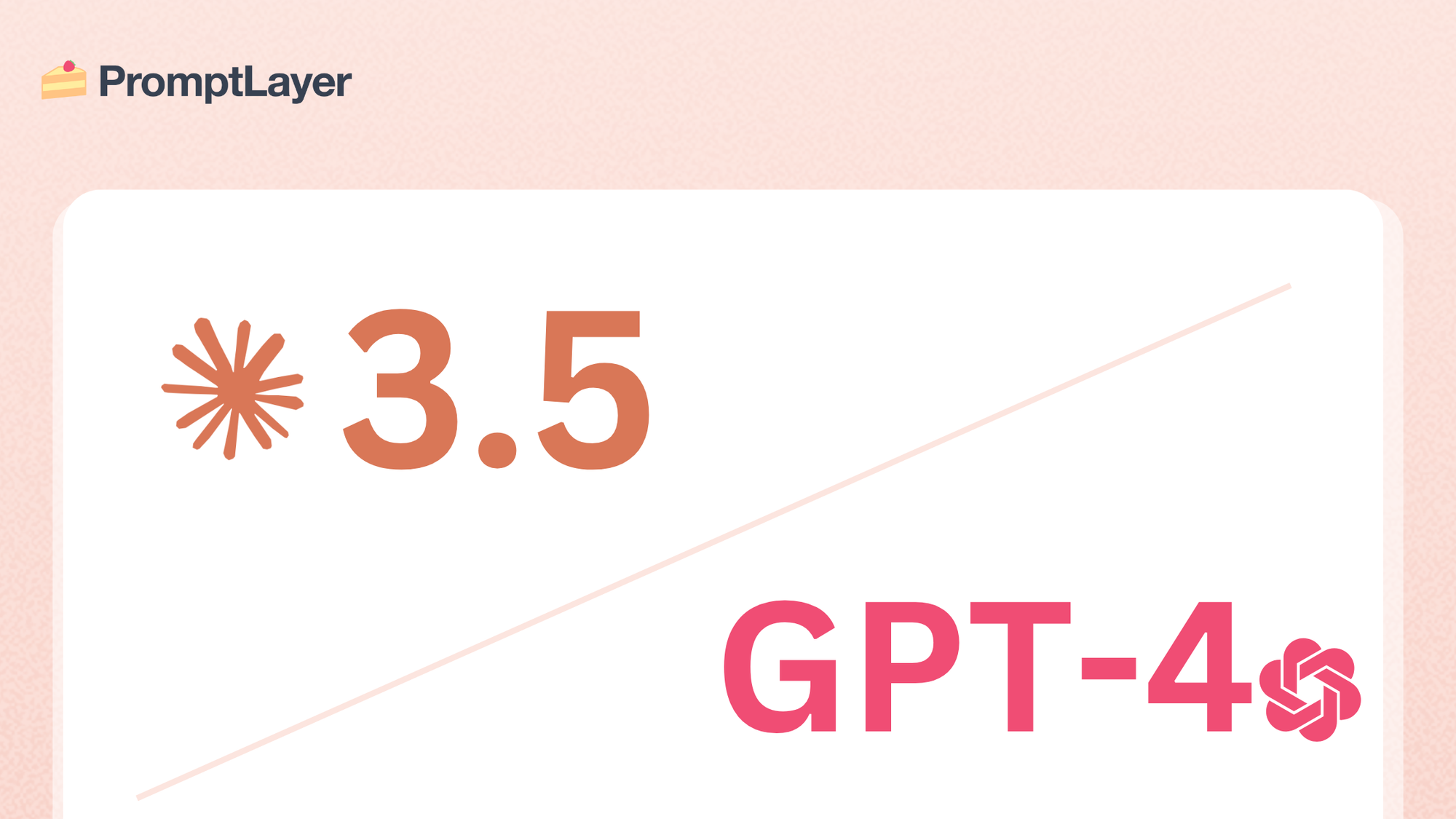Big Differences: Claude 3.5 vs GPT 4o

Table of contents:
- What is Claude 3.5?
- What is GPT 4o?
- Claude 3.5 vs GPT 4o Benchmark Comparison
- Claude 3.5 vs GPT-4o Cost Comparison
- Choosing Claude 3.5 or GPT-4o
Anthropic and OpenAI are once again going head-to-head with the release of their latest large language models (LLMs). This time, the focus is on Anthropic's Claude 3.5 series and OpenAI's GPT-4o series, featuring a unique pair of models from each: Claude 3.5 Haiku and Claude 3.5 Sonnet, alongside GPT-4o and GPT-4o Mini.
While all four models excel in understanding and generating human-like text, they have distinct strengths tailored to different needs. Claude 3.5 Haiku and Sonnet aim to push the boundaries in coding performance and efficiency, while GPT-4o and GPT-4o Mini bring advanced reasoning and multimodal support with a focus on cost efficiency and versatility.
Claude 3.5 Haiku distinguishes itself with fast and efficient processing, performing exceptionally well in coding tasks, whereas Claude 3.5 Sonnet delivers top-of-the-line accuracy, making it ideal for complex applications. On the other hand, GPT-4o and its smaller sibling, GPT-4o Mini, offer strong creative abilities and problem-solving power, with GPT-4o Mini being particularly cost-effective for high-volume or real-time applications.
In this article, we'll break down these models to help you understand their capabilities, costs, and ideal use cases so you can choose the best solution for your needs.
What is Claude 3.5?
- Claude 3.5 Haiku: Released on October 22, 2024, Claude 3.5 Haiku is Anthropic's fastest and most efficient model to date. It surpasses the larger Claude 3 Opus in many intelligence benchmarks, particularly excelling in coding tasks.
- Claude 3.5 Sonnet: Also introduced on October 22, 2024, the updated Claude 3.5 Sonnet model delivers significant improvements across various domains, notably in coding.
What is GPT 4o?
- GPT-4o: OpenAI's GPT-4o is an advanced language model recognized for its reasoning, code generation, and overall performance in benchmarks. It supports over 50 languages and offers great performance in creative writing, multilingual translation, and complex problem-solving.
- GPT-4o Mini: Released in July 2024, GPT-4o Mini is OpenAI's most cost-efficient small model, intended to replace GPT-3.5 Turbo. It is more performant at a lower cost, making it suitable for applications requiring chaining or parallel execution of multiple model calls, processing large amounts of context, and real-time customer support.
PromptLayer lets you compare models side-by-side in an interactive view, making it easy to identify the best model for specific tasks.
You can also manage and monitor prompts with your whole team. Get started here.
Claude 3.5 vs GPT 4o Benchmark Comparison
Below is a comparison of both models on multiple benchmarks of capability:
| Evaluation Category | Claude 3.5 Sonnet | Claude 3.5 Haiku | GPT-4o | GPT-4o mini |
|---|---|---|---|---|
| Undergraduate Level Knowledge (MMLU) | 86.8% (5-shot) | 85.0% (5-shot) | 86.4% (5-shot) | 84.0% (5-shot) |
| Graduate Level Reasoning (GQPA, Diamond) | 50.4% (0-shot CoT) | 48.0% (0-shot CoT) | 35.7% (0-shot CoT) | 33.0% (0-shot CoT) |
| Grade School Math (GSM8K) | 95.0% (0-shot CoT) | 92.0% (0-shot CoT) | 92.0% (5-shot CoT) | 90.0% (5-shot CoT) |
| Math Problem-Solving (MATH) | 60.1% (0-shot CoT) | 58.0% (0-shot CoT) | 52.9% (4-shot) | 50.0% (4-shot) |
| Multilingual Math (MGSM) | 90.7% (0-shot) | 88.0% (0-shot) | 74.5% (8-shot) | 72.0% (8-shot) |
| Code (HumanEval) | 84.9% (0-shot) | 80.0% (0-shot) | 67.0% (0-shot) | 65.0% (0-shot) |
| Reasoning Over Text (DROP, F1 Score) | 83.1% (3-shot) | 80.0% (3-shot) | 80.9% (3-shot) | 78.0% (3-shot) |
| Mixed Evaluations (BIG-Bench-Hard) | 86.8% (3-shot CoT) | 84.0% (3-shot CoT) | 83.1% (3-shot CoT) | 80.0% (3-shot CoT) |
| Knowledge Q&A (ARC-Challenge) | 96.4% (25-shot) | 94.0% (25-shot) | 96.3% (25-shot) | 94.0% (25-shot) |
| Common Knowledge (HellaSwag) | 95.4% (10-shot) | 93.0% (10-shot) | 95.3% (10-shot) | 93.0% (10-shot) |
Note: "CoT" stands for Chain of Thought prompting, and "shot" refers to the number of examples provided before the model's main task.
Claude 3.5 Sonnet generally outperforms the other models, especially in high-complexity tasks such as graduate-level reasoning and math problem-solving. Claude 3.5 Haiku also performs well, though it trails slightly behind Sonnet in most categories. Both Claude models lead the way in coding (HumanEval) and multilingual math (MGSM).
GPT-4o shows competitive performance, particularly in knowledge Q&A and common knowledge tasks, and its reasoning abilities are comparable to Claude models in simpler evaluation categories. GPT-4o Mini, though less powerful, offers a cost-effective alternative with decent performance, especially suitable for straightforward text generation and real-time applications.
Overall, Claude 3.5 Sonnet stands out for its top-tier performance across benchmarks, especially in technical and knowledge-heavy areas, while GPT-4o models prioritize cost-efficiency and broad utility, making them ideal for diverse applications with more modest resource requirements.
Claude 3.5 vs GPT-4o Cost Comparison
| Model | Input Tokens Cost (per 1M tokens) | Output Tokens Cost (per 1M tokens) |
|---|---|---|
| Claude 3.5 Sonnet | $3.00 | $15.00 |
| Claude 3.5 Haiku | $1.00 | $5.00 |
| GPT-4o | $2.50 | $10.00 |
| GPT-4o Mini | $0.15 | $0.60 |
Note: Pricing is based on publicly available information as of November 15, 2024.
When it comes to cost, the four models present a range of options depending on your budget and the volume of input and output tokens required:
Claude 3.5 Sonnet: Priced at $3.00 per million input tokens and $15.00 per million output tokens, Claude 3.5 Sonnet is one of the more expensive options. Its higher price point is justified by its superior performance in complex tasks and coding abilities, making it ideal for high-accuracy applications where quality is paramount.
Claude 3.5 Haiku: With a lower input cost of $1.00 per million tokens and $5.00 per million output tokens, Claude 3.5 Haiku offers a more budget-friendly option compared to Sonnet while still providing strong performance. This model is suitable for developers looking to balance cost efficiency with powerful coding capabilities.
GPT-4o: GPT-4o is priced at $2.50 per million input tokens and $10.00 per million output tokens, placing it between the Claude models in terms of cost. It provides solid performance across creative and problem-solving tasks, making it a versatile choice for various applications without the steep cost of Claude 3.5 Sonnet.
GPT-4o Mini: The most cost-effective model by far, GPT-4o Mini is priced at just $0.15 per million input tokens and $0.60 per million output tokens. This makes it an excellent choice for applications that require high-volume input processing or real-time response capabilities, especially where cost is a primary concern.
Choosing Claude 3.5 or GPT-4o
In most scenarios, the choice between Claude 3.5 (Haiku or Sonnet) and GPT-4o (or GPT-4o Mini) depends on the specific needs of your application:
Cost and Efficiency:
- Claude 3.5 Haiku is the most cost-effective option, especially for input-heavy tasks, at $1 per million input tokens and $5 per million output tokens.
- GPT-4o Mini is also budget-friendly, particularly for high-volume processing, at $0.15 per million input tokens and $0.60 per million output tokens.
- Claude 3.5 Sonnet prioritizes accuracy over cost, priced at $3 per million input tokens and $15 per million output tokens.
- GPT-4o sits in the middle range, offering a balance of cost and performance at $2.50 per million input tokens and $10 per million output tokens.
Performance and Strengths:
- Claude 3.5 Sonnet excels in accuracy and complex tasks, particularly in coding and reasoning.
- Claude 3.5 Haiku offers a strong balance of speed and efficiency, making it ideal for coding and tasks requiring quick processing.
- GPT-4o provides strong reasoning, creative writing, and multilingual support, suitable for diverse applications.
- GPT-4o Mini is optimized for high-volume, real-time applications where cost-efficiency is paramount.
When Would Claude 3.5 Be Preferred?
- High accuracy and complex tasks: Choose Claude 3.5 Sonnet for demanding applications requiring top-tier performance, like advanced reasoning and problem-solving.
- Coding and fast processing: Opt for Claude 3.5 Haiku when speed and efficiency are crucial, particularly in coding tasks and applications with high input volume.
When Would GPT-4o Be Preferred?
- Versatile applications with balanced needs: Choose GPT-4o for a good balance of reasoning, creative writing, and multilingual support at a reasonable cost.
- Cost-effective, high-volume processing: GPT-4o Mini is ideal for large-scale applications, real-time interactions, and scenarios where budget is a primary concern.
Ultimately, the choice between Claude 3.5 and GPT-4o hinges on your specific needs and priorities.
If your priority is top-tier accuracy and complex reasoning, Claude 3.5 Sonnet is the ideal choice. For a balance of speed and efficiency, Claude 3.5 Haiku is a strong contender. If you need a versatile and cost-effective solution, GPT-4o offers solid performance across multiple use cases. Finally, GPT-4o Mini is best for optimizing high-volume processing while keeping costs low. Understanding the strengths of each model will help you choose the best fit for your application and budget.
About PromptLayer
PromptLayer is a prompt management system that helps you iterate on prompts faster — further speeding up the development cycle! Use their prompt CMS to update a prompt, run evaluations, and deploy it to production in minutes. Check them out here. 🍰



